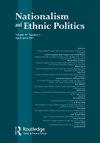Sikh Nationalism: From a Dominant Minority to an Ethno-Religious Diaspora
IF 1.1
Q3 ETHNIC STUDIES
引用次数: 0
Abstract
gant architecture of the institutionalist approach. One limitation is clearly stated by the author: it applies to liberal democracies only (p. 3). Further, only groups that already benefit from territorial autonomy can be studied, thus excluding for instance, metropolitan France’s linguistic communities such as Corsicans, Bretons, Basques, and Catalans. Then, the framework applies to groups mostly living in territorial concentration, as non-territorial (“corporate”) autonomy solutions are not factored in as bargaining chips between the state and the internal national communities. It is only in the additional case of Puerto Rico that a payoff beyond the regional autonomy arrangements is mentioned explicitly—Puerto Ricans are full US citizens when they move to the mainland, suggesting that the pursuit of the localized secessionism is mollified by this “personal exit option” (p. 158). One rival hypothesis that Lecours seeks to refute is the claim that autonomies serve as slippery slopes toward secessionism. This is an endeavor shared with, and endorsed by the group-based approaches explaining ethnopolitics, and particularly scholars working in the tradition of the Ethnic Power Relations or the Minorities at Risk projects. These projects look for the causes of inter-group conflict in the economic, social, and political disparities among communal groups, and remediating interventions for the benefit of the group are considered to have pacifying effects. This operates similarly to the dynamic autonomy arrangements, where the corrective developments requested by the potential beneficiary group might be viewed as structuring features. There is great value in inventorying all the tools that benevolent agents can use to avoid or defuse inter-community animosity, and the concept of dynamic autonomy is a welcome addition to the list. Yet from this wider perspective on communal conflicts, secessionism is only one form of inter-group tensions. The book argues that this specific type of conflict is solely or mainly shaped by the nature of autonomy, calling for an additional investigation on the original rationale for an autonomy status conferral on ethno-national others by their states of residence in the first instance. Unfortunately, the elegant methodology is somewhat closed toward other approaches, inviting a “take it or leave it” attitude on the part of the reader.锡克教民族主义:从占统治地位的少数民族到民族宗教散居
制度主义方法的巨型建筑。作者明确指出了一个限制:它只适用于自由民主国家(第3页)。此外,只能研究已经从领土自治中受益的群体,从而排除了例如法国大都市的语言社区,如科西嘉人、布列塔尼人、巴斯克人和加泰罗尼亚人。然后,该框架适用于主要生活在领土集中的群体,因为非领土(“公司”)自治解决方案不被视为国家与内部民族社区之间的谈判筹码。只有在波多黎各的另一个案例中,明确提到了区域自治安排之外的回报-波多黎各人在迁移到大陆时是完全的美国公民,这表明这种“个人退出选择”缓和了对局部分离主义的追求(第158页)。勒库尔试图反驳的另一个假说是,自治是走向分离主义的滑坡。这是一项共同的努力,并得到了以群体为基础的解释民族政治的方法的支持,特别是那些从事民族权力关系传统或处于危险中的少数民族项目的学者。这些项目在社区群体之间的经济、社会和政治差异中寻找群体间冲突的原因,并为群体的利益采取补救措施,被认为具有安抚作用。这与动态自治安排类似,其中潜在受益群体所要求的纠正性发展可能被视为结构特征。善意的代理人可以使用所有工具来避免或消除社区间的敌意,这是非常有价值的,动态自治的概念是列表中一个受欢迎的补充。然而,从更广泛的角度来看,分裂主义只是族群间紧张关系的一种形式。这本书认为,这种特殊类型的冲突完全或主要是由自治的性质形成的,要求对最初由其居住国家赋予民族-民族其他人自治地位的原始理由进行进一步调查。不幸的是,这种优雅的方法在某种程度上对其他方法是封闭的,导致读者采取“接受或放弃”的态度。
本文章由计算机程序翻译,如有差异,请以英文原文为准。
求助全文
约1分钟内获得全文
求助全文
来源期刊

Nationalism and Ethnic Politics
ETHNIC STUDIES-
CiteScore
1.30
自引率
0.00%
发文量
30
期刊介绍:
Nationalism & Ethnic Politics explores the varied political aspects of nationalism and ethnicity in order to develop more constructive inter-group relations. The journal publishes case studies and comparative and theoretical analyses. It deals with pluralism, ethno-nationalism, irredentism, separatism, and related phenomena, and examines processes and theories of ethnic identity formation, mobilization, conflict and accommodation in the context of political development and "nation-building". The journal compares and contrasts state and community claims, and deal with such factors as citizenship, race, religion, economic development, immigration, language, and the international environment.
 求助内容:
求助内容: 应助结果提醒方式:
应助结果提醒方式:


